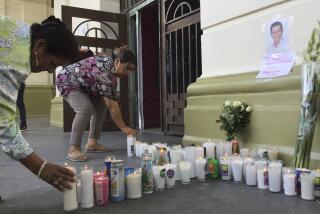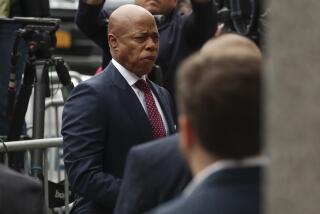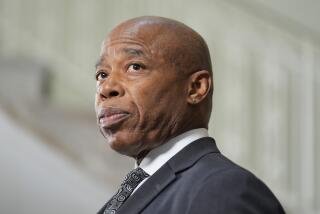Released Salvadoran Mayor Giving Up Politics
- Share via
TECAPAN, El Salvador — After six months of living “under the trees” as a rebel prisoner, the 25-year-old mayor of this small town of farmers says he is through with politics.
Francisco Nelson Ayala, a Christian Democrat, was one of 23 kidnaped municipal officials released Thursday night in a massive prisoner exchange that included President Jose Napoleon Duarte’s daughter.
On Saturday, surrounded by friends and family in his two-room adobe house, the boyish mayor said that he just wants to work as a salesman.
“I am not willing to return to the job of mayor, and I think the reason is pretty clear,” Ayala said.
His sentiment was echoed by 64-year-old Galileo Humberto Castillo, the mayor of Ereguayquin, another town in the eastern province of Usulutan.
“At my age, I need to rest,” said Castillo, who was also freed Thursday.
One Mayor Was Killed
The Farabundo Marti National Liberation Front rebels began kidnaping the mayors last April, arguing that the local officials had no right to govern in guerrilla-contested areas. The rebels said that the mayors were part of a U.S. counterinsurgency campaign, administering U.S.-funded aid programs. To emphasize their point, they killed one mayor in San Jorge, in Usulutan province, about 70 miles southeast of San Salvador, the capital.
In further attempts to disrupt local governments, the guerrillas also burned dozens of town halls throughout the provinces of Usulutan, Morazan, La Union, San Miguel and Chalatenango, and destroyed birth, death, marriage and voting records.
Their campaign has been effective. Not only did they remove 23 mayors and other municipal officials through kidnapings, but many other mayors and local officials have resigned or left their towns in fear. At least one-fourth of the country’s 262 mayors have resigned or been forced to move their operations to other towns where they can work under the protection of soldiers.
Replacement Difficulty
Not only do the mayors who were kidnaped say they will not return to work, but the government may find it difficult to replace them.
In Tecapan, a town of about 5,000, Ayala’s temporary replacement says that he is not sure he wants the job for keeps.
City Hall Closed
The Tecapan City Hall, burned last May when Ayala was kidnaped, is closed, and acting Mayor Jose Mario Jimenez works on borrowed furniture in a town about two miles away, where he and two other mayors are under the protection of the National Guard.
“I don’t even stay in my house. I only come home when there are soldiers here. During the day, I am strong, but there is some fear,” Jimenez said.
“If they (the guerrillas) continue to bother the mayors and city halls, I may ask the government for papers to go to the United States and work,” he said.
Jimenez said that he earns the equivalent of about $58 a month for the job.
Town Lacks Judge
Tecapan also has no judge, since its magistrate left unexpectedly five days after Ayala was abducted and the government has yet to name a new one. The town is usually without electricity and often without water, which must be pumped up from another town.
When the guerrillas stop transportation on the highways, as they have done at least 10 times this year, many of the town’s schoolteachers don’t show up for work.
Ayala was at home last May 11 when an acquaintance brought him a note from rebels asking to speak with him. When he arrived to meet the armed men, they informed him that he was a political prisoner.
“I asked them if I could resign. I said it wouldn’t be inconvenient if I could do that,” he said.
But the rebels kept him in custody with two other mayors, and for the next six months they lived in the countryside, moving every week or so to avoid military confrontations.
“We lived under the trees in the open air. When it rained, they put up plastic tents,” Ayala said.
Feared Mortars, Bombs
Ayala said he never feared that the guerrillas would kill him, but he was afraid of the shooting and mortar fire of combat and the army’s aerial bombings--of which he saw about three.
He said that the guerrillas had only one political talk with him during the six months, in which they said that they were fighting on behalf of poor people.
He said he is not bitter at the guerrillas for having kidnaped him or at the government for having taken six months to negotiate his freedom.
“I am a poor man, and I am conscious that our country is in a state of war. At any moment, we can become part of the changes of the war,” he said.
Like Ayala, Mayor Castillo is still tired and nervous from his six-month ordeal but not angry.
He said he believes that the government did what it could to free him, and added, apparently without malice, that he knew the abduction of Duarte’s daughter, Ines Guadalupe Duarte Duran, would help the kidnaped mayors.
“I knew that he would feel in his own skin what our families had felt for us. As a human being, I was sorry for him, but I was convinced that it would help us, and it did,” Castillo said.
More to Read
Sign up for Essential California
The most important California stories and recommendations in your inbox every morning.
You may occasionally receive promotional content from the Los Angeles Times.










